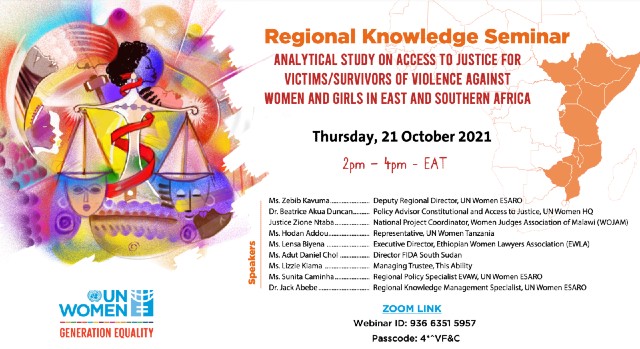
Analytical Study on Access to Justice for Victims/Survivors of Violence Against Women and Girls in East and Southern Africa

Event description
UN Women East and Southern Africa Regional Office (ESARO) undertook a Multi-Country Analytical Study of Access to Justice for Victims/Survivors of Violence Against Women and Girls in the year 2020/21 in ten countries in the region, namely Mozambique, Kenya, Tanzania, Uganda, Burundi, Ethiopia, Somalia, South Sudan, Malawi and Zimbabwe. The study aimed to contribute to UN Women’s work supporting an enabling legislative and policy environment in support of gender equality and empowerment of women and girls and improving women and girls’ access to quality justice services.
Objectives of the Knowledge Seminar
- To disseminate the study on access to justice from the 10 country offices and inform future regional and country-level programmes on access to justice for women based on the findings and recommendations.
- To identify the way forward and solutions to address access to justice based on the recommendations to the ESA region as regards access to justice.
Our main target audience is as follows:
All UN Women country offices in ESA Region are targeted. The COs shall invite representatives from the judiciary (judges, magistrates, public interest lawyers, ministries of gender, security-police and administration officers, the traditional justice system, religious institutions, academia, media, CSOs, CBOs, INGOs in Justice, UN agencies working in the justice sector such as UNDP, OHCHR, UNHCR, UNODC, RECs-AU, IGAD, EAC, COMESA. Participants will include women with disabilities, GBV survivors and other marginalized groups where possible.